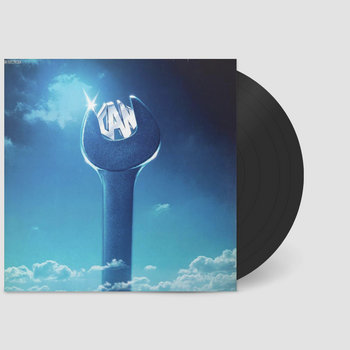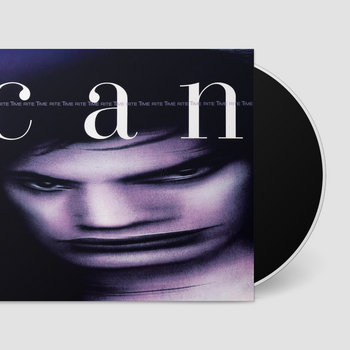
Can: A simple word that defies a million web searches. A noun and a verb, the English conjugation of the latter produces the repetition: can, can, can, can, can, can.
When the German band Can (or CAN) formed in 1968, first under the name Inner Space, keyboardist Irmin Schmidt and bassist Holger Czukay—both students of the exalted avant-garde composer Karlheinz Stockhausen—were drawn to the energy and roiling possibilities of rock music which, in the late ‘60s, was full of experimentation and edging into new musical territory. They were joined by Jaki Liebezeit, the leading free jazz drummer in Germany who was looking for something new, and young guitarist Michael Karoli, a music student of Czukay’s. All were exceptional instrumentalists. They added American sculptor and poet Malcolm Mooney as vocalist, and it was Mooney who suggested the name change: Can was born.
No label picked up their first, self-produced recording. But a combination of social connections and luck—essential to the story of the band—brought the musicians to a castle near Cologne, the Schloss Nörvenich, which they used as a recording studio, and that’s where the essence of Can took shape. The musicians would improvise for extended periods, looking for a mode or groove to work out together, with Mooney extemporizing vocals and words. Just as Miles Davis was doing with producer Teo Macero, the band would keep the tapes rolling all the while and would later go back, listen, and create tracks through editing.
From the start, Can was more than a rock band. They were a singular ensemble making new music that had the sonic spirit and feel of rock but also stretched into avant-garde classical structural techniques and concepts, using drones, free improvisation, beat poetry, psychedelia, non-Western music, ambient sounds, and more. At their peak, they were one of the most gripping and enthralling rock bands ever.
Can has also been massively influential. Not in the sense of musicians imitating what they did—this was a group of virtuosos in technique and artistry with a collective vision, impossible to imitate—but in the way that a rock band could create music with almost complete freedom, provided there was a core idea or structure that encompassed a world in which everything fit. Public Image Ltd., Sonic Youth, Radiohead, Tortoise, and others all have very different sounds but play in a vast field laid out by Can.
Can’s entire discography is on Bandcamp, here is a guide to the band’s different eras and most important recordings.
Essentials
Can’s first five albums comprise one of the finest sequences in the history of recorded music, established the band’s eternal greatness and importance, and are essential for a music library.
Monster Movie





Vinyl LP, Compact Disc (CD)



The first official Can album, after they failed to find a label for their self-produced recording Prepared to Meet Thy Pnoom. Drop the needle and from the first seconds of the keyboard pattern, drone-like groove, and Mooney speak-singing, there’s a compelling desire to time-travel back to the summer of 1969 to see the impact of this music on an unsuspecting world. The surface sound fits into the garage rock and psychedelia of the era, but the way Leibzeit’s backbeat and Karoli’s keening guitar twine around the hypnotic core is still more radical and accomplished than nearly all the rock and post-rock of the past 50+ years.
Tago Mago
Compact Disc (CD), Vinyl LP



If there’s one Can album to have, this is it. It’s the most “Can-ny” of their records, with an expansive scope that brings together all their musical virtues. Its mere existence is uncanny and happenstance: with Mooney gone, Czukay and Liebezeit saw Damo Suzuki performing in the streets of Munich and asked him to front the band that night at a live show. The rest is amazing history. The rock style runs deep, as does the sense of improvisation to carve time into grooves that feel ancient and ritualistic. The rhythm section has never been better, leaving Suzuki and Karoli to insinuate themselves into every crevice, the latter is at his best, adding small phrases and comments that carry enormous expression. There is heavy drone, heavy funk, heavy psychedelia, all put together with Schmidt’s music concrète editing. One of the very few musical documents that follows the methods of Bitches Brew, it’s just as incredible, important, and essential.
Ege Bamyasi


Compact Disc (CD), Vinyl LP


This is the closet that the first version of Can ever got to putting out a conventional rock album, a disc with a series of vocal tracks that could conceivably be singles, especially the quasi synth-pop track “Spoon,” which was used as theme music for a German television show. “One More Night” shows the genius of Can, an incredible groove made of interlocking phrases that all have different lengths (this was 1972, the year after Steve Reich finished Drumming), Karoli pricking at the sound field, Suzuki nearly whispering on top.
Future Days


Compact Disc (CD), Vinyl LP


A beautiful and mysterious album, Future Days opens with gentle, abstract ambient washes then the delicate, shuffling beat of the title track comes into focus. That is the mellow side of Can, while “Spray” has them sounding closest to their musical soulmate, the contemporary electric music of Miles Davis.
Soon Over Babaluma


Vinyl LP, Compact Disc (CD)


Suzuki left the band after Future Days to marry and to join the Jehovah’s Witnesses. The short-term result was that this album was heavily instrumental, with a bit more focus on small-scale structural ideas of rhythm and song form, with Karoli and Schmidt handling the vocals. But the grooves are still there, the hypnotic pulse that gets into the body and mind. This is still Can at their finest, and one of their prettiest discs.
Changes
Can
Compact Disc (CD), Vinyl LP


Suzuki’s departure signaled the kind of slow dissipation of the band that is a familiar story in the history of rock. He was replaced by Jamaican bassist Rosko Gee and Ghanaian percussionist Rebop Kwaku Baah, and the musicianship of the band actually rose—but at the loss of Suzuki’s ineffable but evocative personality. The albums that followed are not bad, but there’s a meaningful difference—however slight—between an extraordinary, groundbreaking musical collective and a hip art-rock band making an album that has a few terrific tracks and several others that are merely good. While the world awaits a sorely needed “Best Of” compilation from the years 1975–1979, this album is a solid example of the era, and the opening track became the title of Rob Young’s superb 2018 band biography, All Gates Open.
Rite Time
Compact Disc (CD), Vinyl LP


Can reunited with Mooney on board for this 1986 release, their final studio recording. Almost 20 years after they began, some edge has naturally been worn off. But the band also has absorbed the changes in music around them—especially new wave, and subtle ideas they seem to have picked up from the likes of Peter Gabriel, David Bowie, and others. And there’s definitely concessions to pop ideas, but there are plenty of gems. Consider it a generous encore after an extraordinary career.
Compilations
The Lost Tapes


Compact Disc (CD)


The sound of the sausages being made. These are studio outtakes (with a few contemporaneous and stirring live recordings) from 1968–1977 that hint at the band’s creative process. There are fragments that were discarded, and longer tracks, like “Dead Pigeon Suite,” that contain material that Schmidt edited into different final tracks. Strip off the recording tracks, carve out Suzuki’s vocals, and you have “Vitamin C,” from Ege Bamyasi.
Soundtracks



Vinyl LP, Compact Disc (CD)



Monster Movie was released in 1969, and by 1970 Can could already release this compilation album of the music they’d made for movies and television. It’s another stunning album from the band’s greatest period and also encompasses the transition between Mooney’s tenure behind the mic (he sings on “Soul Desert” and the bluesy “She Brings the Rain”) and Suzuki’s.
Delay 1968


Compact Disc (CD), Vinyl LP


Prepared to Meet Thy Pnoom in all but name, this album collects the first recordings that Can failed to land at a label, and so it also exists as the third record with Mooney. This is Can when they were not yet who they would become, working through some scattered directions and a (snarky?) response to King Crimson via “Nineteen Century Man.” As “Theif” shows, all the elements were just about to come together.
Unlimited Edition


Vinyl LP, Compact Disc (CD)


A valuable collection of unreleased tracks that span Can’s beginning into the initial post-Suzuki era. The range of styles may be surprising, not just quirky instrumental fragments and song experiments, but also the Beefheartian “Mother Upduff (May 69),” which adds to the portrait of Mooney. If The Lost Tapes is a grand landscape, this album is the early sketches on the verso.
Live in …






Vinyl LP, Compact Disc (CD)




The most exciting thing in current Can-dom is a series of archival releases, live performances that are sort of official bootlegs; not originally meant for release—“Fünf” cuts off abruptly as it seems to be descending to a finish—but good quality recordings curated by Schmidt. The most recent one is a Paris gig from 1973, shortly before Suzuki left the band. Like the initial studio albums, these are all part of a mosaic—one is not enough, but this is an excellent starting point. Like the other live albums, the tracks are identified by numbers, “Eins,” “Zwei,” “Drei,” etc, but the foundations of “One More Night,” “Spoon,” and other songs are here. They’re the starting point for hellacious group improvisations, the band locked into thrilling grooves. Karoli’s guitar swims through and soars over the textures, this might be his most intense and beautiful playing caught on record.







